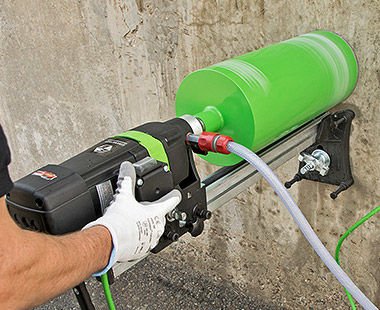Diamond Core Drills for Concrete: Which Drill to Choose for Tough Surfaces?
When it comes to drilling through tough surfaces like concrete, having the right tool is essential for ensuring efficiency, precision, and longevity. Diamond core drills are widely recognized for their ability to handle tough materials such as reinforced concrete, masonry, and stone. However, with so many options available, it can be difficult to choose the right drill for your project. In this article, we will explore the features you should consider when selecting a diamond core drill for concrete and provide recommendations to help you make an informed decision.
What Are Diamond Core Drills?
Diamond core drills are specialized tools designed to cut through hard, dense materials like concrete, brick, stone, and asphalt. Unlike traditional drills, which use a rotating bit to create a hole, diamond core drills use a hollow, cylindrical bit with diamond segments embedded in the cutting edge. This design allows them to efficiently remove material in the form of a core, creating clean and precise holes without causing excessive damage to the surrounding surface.
Diamond core drills are used in a variety of applications, including construction, demolition, plumbing, and electrical work. They are perfect for creating holes for pipes, wiring, ventilation systems, and other installations in concrete structures.
Key Factors to Consider When Choosing a Diamond Core Drill
1. Type of Material
The first factor to consider when selecting a diamond core drill is the type of material you will be drilling into. Concrete is a dense and tough material that requires specialized equipment. Ensure that the drill you select is specifically designed for concrete or reinforced concrete. For standard concrete, a general diamond core drill will suffice, but if you’re drilling through reinforced concrete, a more robust drill with specialized features may be required.
2. Drill Size and Diameter
Diamond core drills come in a variety of sizes, ranging from small, handheld models to larger, industrial-grade drills. The size of the hole you need to create will dictate the size of the drill bit you should choose. If you need to create large holes for plumbing or electrical installations, opt for a drill with a wider diameter.
Additionally, consider the depth of the hole you need to drill. Some diamond core drills are designed for deep drilling, while others may only be suitable for shallow holes. Be sure to choose a drill that matches the specific requirements of your project.
3. Wet vs. Dry Drilling
Diamond core drills can be used for both wet and dry drilling, depending on the specific model and the project requirements. Wet drilling is ideal for cooling the bit and reducing dust, while dry drilling is typically faster and more convenient for smaller projects.
If you are working in a confined space or need to minimize water use, dry drilling may be the best option. However, for larger projects or when drilling through tougher concrete, wet drilling is often preferred. Wet drilling can help extend the life of the diamond core bit and provide a cleaner cut, especially in reinforced concrete.
4. Power Source
Diamond core drills come in both electric and petrol-powered models. Electric drills are suitable for most indoor projects and offer greater control, precision, and ease of use. They are generally quieter and more environmentally friendly than petrol-powered drills.
Petrol-powered drills are ideal for outdoor use, particularly on larger construction sites where mobility is essential. They provide greater power and are capable of handling heavy-duty applications, such as large-scale concrete cutting.
5. Drill Speed and Rotation
The speed and rotation of the drill are important factors to consider. Higher speeds are generally better for softer concrete, while slower speeds are recommended for tougher, reinforced concrete. Look for a drill that allows you to adjust the speed to suit your specific project.
Additionally, consider the type of rotation. Some diamond core drills feature a two-speed gearbox that allows you to switch between high-speed rotation for regular drilling and lower-speed rotation for more demanding tasks.
6. Durability and Build Quality
Since diamond core drills are often used in tough and demanding environments, it’s important to choose a tool that is built to last. Look for a drill with a durable, high-quality construction that can withstand the pressures of frequent use. The best drills are typically made from heavy-duty materials like metal alloys and high-strength steel.
Check the build quality of the drill’s body, motor, and handle. A well-built drill will not only last longer but will also offer better performance and control during use.
7. Cost and Brand Reputation
Finally, consider the cost and the reputation of the brand when purchasing a diamond core drill. While it’s tempting to opt for the cheapest option, investing in a high-quality tool will save you money in the long run by reducing maintenance costs and improving performance.
Look for reputable brands known for manufacturing durable and reliable diamond core drills. Some well-known brands include Bosch, Hilti, and Makita. Check reviews from other users to ensure that the drill performs as expected and meets your needs.
For more information on choosing the right drill bit for concrete, you can refer to this detailed guide on wiertło koronowe do betonu.
Conclusion
Selecting the right diamond core drill for concrete requires careful consideration of several factors, including the type of material, drill size, power source, and drilling method. By understanding these key features and selecting a high-quality tool, you can ensure that your drilling tasks are completed efficiently and with precision. Whether you’re a professional contractor or a DIY enthusiast, investing in the right diamond core drill will help you achieve clean, precise holes in even the toughest concrete surfaces.






